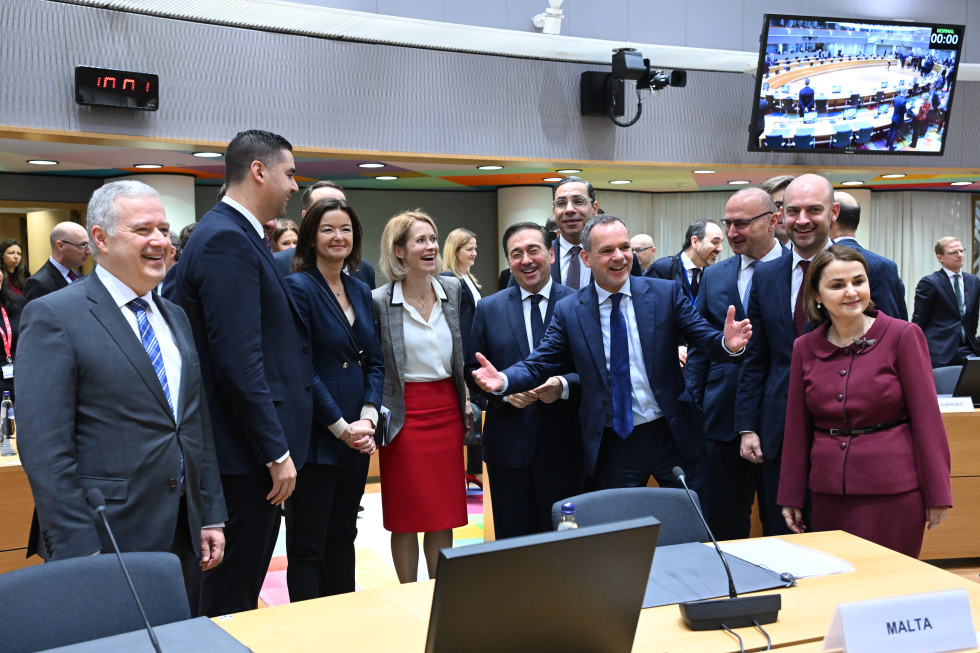Minister Fajon: EU must work for a peace acceptable to Ukraine

EU foreign ministers with EU High Representative for Foreign Affairs and Security Policy Kaja Kallas | Author Ministrstvo za zunanje in evropske zadeve
The first topic discussed was the war in Ukraine and the role of the EU in peace negotiations. "Without an end to Russian aggression in Ukraine, we cannot talk about a safe and strong Europe. It is therefore crucial that the EU plays an active role in peace negotiations and works towards a peace that is acceptable to Ukraine. We need to be united to achieve this," Minister Fajon said in her speech. The ministers adopted the 15th sanctions package against Russia and agreed on the first listings of individuals under the sanctions regime against Russian hybrid threats. The debate on Ukraine was also attended by Ukrainian Minister of Foreign Affairs Andrii Sybiha via videoconference and European Commissioner for Enlargement Marta Kos.
A discussion followed on the EU’s response to the current situation in Georgia, with Minister Fajon reiterating Slovenia’s condemnation of the violence against protesters, journalists and civil society, and calling for a concrete EU response that would not affect the Georgian people: “We want Georgia to continue on its European path. We support a concrete response from the EU, including the adoption of targeted sanctions against those responsible for the violence and human rights violations in the country's protests". She also expressed support for visa requirements for holders of diplomatic and service passports.
With regard to the situation in the Middle East, the Foreign Affairs Council focused on Syria. They agreed on the need to protect civilians and minorities and to preserve Syria's territorial integrity and sovereignty. Minister Fajon emphasised: “The Syrian people must be given the chance to rebuild their country. It is important that all the actors involved refrain from violence and allow for a peaceful political transition." She also supported the efforts of the UN Special Envoy for Syria, Geir Pedersen, to find an inclusive political solution that meets the aspirations of the Syrian people.
In the debate on Israel and Palestine, Minister Fajon stressed the need to promote solutions for a lasting peace, adding that Slovenia has always supported respect for international law and the strengthening of the role of international courts: "The EU’s policy towards Israel should be guided by the ICJ's advisory opinion on the legal implications of Israel's policies and practices in the Occupied Palestinian Territory". Regarding the EU-Israel Association Council to be held in early 2025, Minister Fajon said that Slovenia was in favour of talks with Israel, but that the issue of respect for human rights had to be addressed in this context. She also called for a high-level EU-Palestinian dialogue and expressed concern about the uncertain future of the United Nations Relief and Works Agency for Palestine Refugees in the Near East (UNRWA), which is key to providing much-needed humanitarian assistance to the Palestinian people.
Under any other business, Austrian Foreign Minister Alexander Schallenberg, on behalf of the group of Friends of Western Balkans, of which Slovenia is a member, presented a letter from the ministers to Kaja Kallas and Marta Kos on the importance of EU enlargement to the Western Balkans and of strengthening cooperation with the region, including in the area of the Common Foreign and Security Policy. “Slovenia is committed to keeping the countries of the region high on the EU agenda. This is a moment for enlargement that must be seized by all," she said, briefing colleagues on her recent visit to Podgorica.
Prior to the meeting, the ministers held an informal meeting to discuss how to improve the working methods of the Foreign Affairs Council, during which Minister Fajon called for unity, a more efficient decision-making process and cooperation with EU partners. She suggested that representatives from the Western Balkans and the Eastern Neighbourhood should participate more frequently in Foreign Affairs Council meetings.

